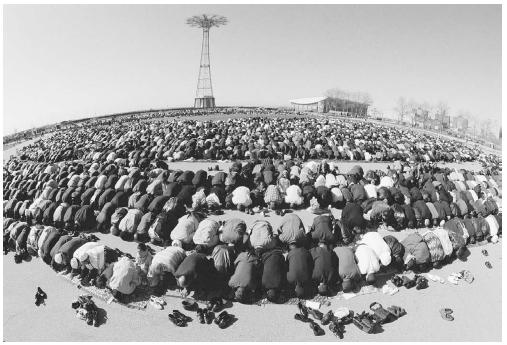How the Major Religions View the Afterlife
Islam
In regard to the concept of a soul, Islam envisions a human as a being of spirit and body. The creation of Adam as described in the Qur'an (or Koran) is reminiscent of Genesis in the Judeo-Christian Bible as the Lord announces to the angels that he is going to create a human of clay and that he will breathe his spirit into him after he has given him form. "And He originated the creation of man out of clay, then He fashioned his progeny of an extraction of mean water, then He shaped him, and breathed His spirit in him." (Qur'an 32:8–9)

Muhammed (570 C.E.–632 C.E.) appears to have regarded the soul as the essential self of a human being, but he, adhering to the ancient Judeo-Christian tradition, also considered the physical body as a requirement for life after death. The word for the independent soul is nafs, similar in meaning to the Greek psyche, and the word for the aspect of the soul that gives humans their dignity and elevates them above the animals is ruh, equivalent to the Greek word nous. These two aspects of the soul combine the lower and the higher, the human and the divine.
As in the other major religions, how one lives on Earth will prepare the soul for the afterlife, and there are promises of a paradise or the warnings of a place of torment. The Qur'an 57:20 contains an admonition concerning the transient nature of life on Earth and a reminder of the two possible destinations that await the soul after death: "Know that the present life is but a sport and a diversion, an adornment and a cause of boasting among you, and a rivalry in wealth and children. It is as a rain whose vegetation pleases the unbelievers; then it withers, and you see it turning yellow, then it becomes straw. And in the Hereafter there is grievous punishment, and forgiveness from God and good pleasure; whereas the present life is but the joy of delusion."
Muhammed speaks of the Last Judgment, after which there will be a resurrection of the dead which will bring everlasting bliss to the righteous and hellish torments to the wicked. The judgment will be individual. No soul will be able to help a friend or family member, he warns; no soul will be able to give satisfaction or to make intercession for another.
While the doctrine of the resurrection of the body has never been abandoned in Islam, later students of the Qur'an sought to define the soul in more metaphysical terms, and a belief in the preexistence of souls was generally established. In this view, Allah kept a treasure house of souls in paradise available for their respective incarnations on Earth.
The Islamic paradise is in many ways an extension of the legendary Garden of Eden in the Bible. It is a beautiful place filled with trees, flowers, and fruits, but it really cannot be expressed in human terms. It is far more wonderful than any person could ever imagine. "All who obey God and the Apostle are in the company of those on whom is the grace of God—of the Prophets who teach, the sincere lovers of Truth, the witnesses [martyrs] who testify, and the righteous who do good: Ah! What a beautiful fellowship!" (Qur'an 4:69)
Hell is a place of torment, and, like the image held by many Christians, a place of fire and burning. In the Islamic teachings, neither heaven nor hell last throughout eternity. Infinity belongs to Allah alone, and there may exist various stages of paradise and hell for those souls who dwell there.

Comment about this article, ask questions, or add new information about this topic: